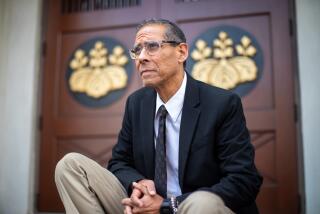Relatives speak of loss at Turner penalty trial
It was a day of pain, more pain and nothing but pain.
Family members testified about their lost loved ones, all victims of one of Los Angeles’ most prolific serial killers, Chester Turner.
Even fond memories were quickly consumed by an overwhelming sense of loss.
“I know this sounds crazy. But somehow in a dream she came to me,” said Phyllis Fishman, whose daughter Anita Fishman was one of Turner’s early victims. “She said she was at peace. I said, ‘Who did this to you?’ She said, ‘It doesn’t matter. It will be taken care of some day.’ What could I do but believe her?”
Turner was convicted April 30 of murdering 10 women between 1987 and 1998, mainly in South Los Angeles. Jurors in the penalty phase of the trial now are considering whether he should join the 664 inmates on California’s death row.
Dorothy Patterson, whose mother, Regina, was killed by Turner, said she was left alone when her mother died.
“I am an only child. I have no sister or brothers or nothing,” Patterson said. “It just hurts.”
Tiviea Wade-Moore, niece of Desarae Jones, identified her aunt’s body. She was 16. She is now enrolled in law school with the objective, she told jurors, of “bringing justice to the person who murdered my auntie.”
Patricia Jones, Desarae Jones’ mother, regularly attended the six weeks of Turner’s trial.
“You never get over it. Never. I don’t care what nobody does, you just want your child back,” she said. “You don’t have that chance any more. Somebody took it away.”
Turner, 40, sat quietly with his lawyers, showing little emotion as survivors were led through their testimony by Los Angeles County Deputy Dist. Atty. Bobby Grace.
Testimony often was accompanied by blow-ups of family pictures from happier times.
California law gives survivors the right to tell jurors of their loss because they are considered crime victims.
Turner’s lawyers did not ask a single question of any survivor Monday afternoon, a testament to the power of their accounts delivered in the downtown courtroom of Superior Court Judge William Pounders.
Sheryl King, Fishman’s younger sister, told of how they had dreamed of raising families side by side.
“My kids never had the opportunity to meet her. We never got to do all the things we had planned,” she said. “We all miss her very much. We wonder what her life would have been like.”
The victims, in the order they died, were Diane Johnson, 21; Annette Ernest, 26; Anita Fishman, 31; Regina Washington, 27, and her fetus; Andrea Tripplett, 29; Desarae Jones, 29; Natalie Price, 31; Mildred Beasley, 45; Paula Vance, 38; and Brenda Bries, 37. All were addicted to crack cocaine and many were street prostitutes.
DNA samples of semen and other bodily fluids taken from each victim matched Turner’s genetic profile.
David Allen Jones, wrongfully convicted of two of the murders, was cleared by DNA tests after serving 11 years in prison.
Turner joins the roster of Los Angeles’ most prolific serial killers, including Charles Manson, “Night Stalker” Richard Ramirez and “Freeway Killer” William Bonin.
Prosecutors described Turner as a savage predator fixated on violence, dominance and control, from which he derived sexual satisfaction.
Tripplett’s mother, Jerri Johnson, spoke of the agony of living through her daughter’s death.
“As a parent, you never think you’re going to look down and bury your child. You always think your child is going to bury you.”
More to Read
Sign up for Essential California
The most important California stories and recommendations in your inbox every morning.
You may occasionally receive promotional content from the Los Angeles Times.









